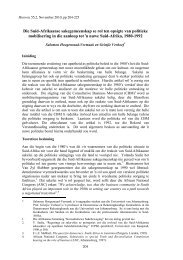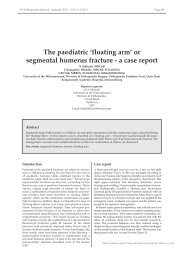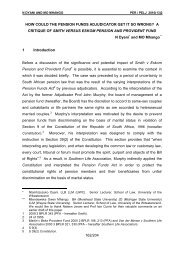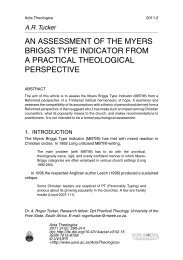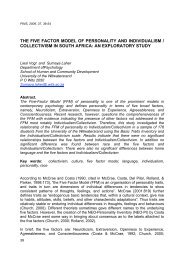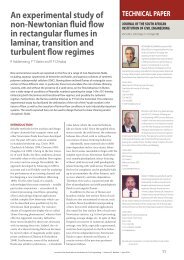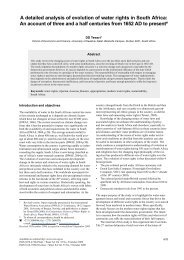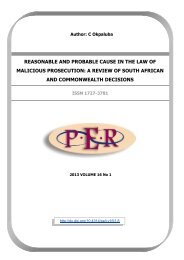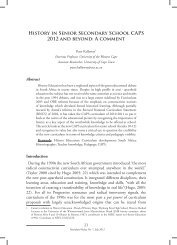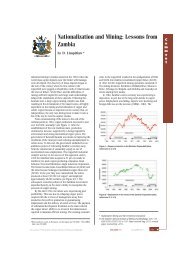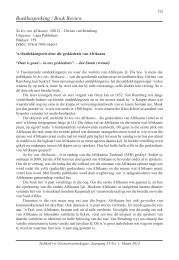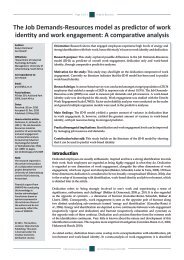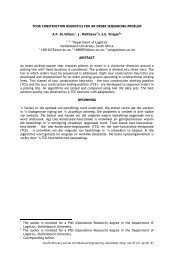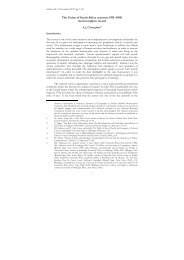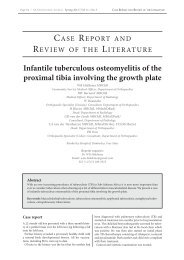Frances Baard's and Helen Joseph's struggle against apartheid ...
Frances Baard's and Helen Joseph's struggle against apartheid ...
Frances Baard's and Helen Joseph's struggle against apartheid ...
Create successful ePaper yourself
Turn your PDF publications into a flip-book with our unique Google optimized e-Paper software.
Musiiwa - <strong>Frances</strong> Baard’s <strong>and</strong> <strong>Helen</strong> Joseph’s <strong>struggle</strong><br />
experiences. In the light of this observation, this article intends to narrow down to a<br />
comparative analysis of the ways in which women perceive their experiences of the same<br />
phenomena, but from different methodological perspectives.<br />
The attempt to reconstruct history “from the bottom up” <strong>and</strong> the varieties of<br />
radical history that document social conflict from the point of view of the oppressed, has<br />
accorded personal narratives a strong impetus <strong>and</strong> has placed them in the forefront of<br />
women’s history. 8 As noted by Kathryn Anderson et al.: “Oral History is a basic tool in<br />
our efforts to incorporate the previously overlooked lives, activities <strong>and</strong> feelings of<br />
women into our underst<strong>and</strong>ing of the past <strong>and</strong> present.” 9 Beginning in the late 1980s,<br />
some of the scholars of African women’s history depended on life histories to recapture<br />
women’s voices because, according to Susan Geiger, “First, written records, whether<br />
colonial or African, are overwhelmingly <strong>and</strong>rocentric … With a few notable exceptions<br />
such documentation ignores women unless they cause trouble or constitute a problem.” 10<br />
Since then, women’s life histories have constituted an important source of information.<br />
As Jean Davison notes, “African women’s narratives provide a unique opportunity to<br />
grasp the concrete dailiness of their lives in the process of change”. 11 In fact, Akosua<br />
Adomako Ampofo et al. note that: “The use of various forms of historical methods, such<br />
as oral history <strong>and</strong> autobiographical <strong>and</strong> biographical studies, helped redefine<br />
conventional underst<strong>and</strong>ings of various historical events <strong>and</strong> processes.” 12 Given the<br />
prominence of qualitative research, life histories <strong>and</strong> autobiographies shed light on both<br />
the introspective <strong>and</strong> retrospective course of a life over time, <strong>and</strong> they provide room to<br />
interpret life in its historical <strong>and</strong> cultural contexts. While it is true that an underst<strong>and</strong>ing<br />
of the “insider” (emic) view is particularly important <strong>and</strong> a much needed corrective to the<br />
“outsider” (etic) approaches to theory, the use of autobiographies <strong>and</strong> life histories,<br />
which centre on the construction of selfhood, raises important methodological <strong>and</strong><br />
epistemological issues in comparative women’s political history. It is <strong>against</strong> this<br />
backdrop that the article seeks to appreciate the similarities <strong>and</strong> differences in women’s<br />
perception <strong>and</strong> representation of their experiences of the same phenomenon.<br />
This article centres on two political narratives, a South African woman’s<br />
autobiography <strong>and</strong> a South African woman’s life history. Both were published in 1986<br />
<strong>and</strong> are used to decipher the levels at which women’s perceptions of their experiences of<br />
the <strong>struggle</strong> <strong>against</strong> <strong>apartheid</strong> can be compared. The article focuses on the period<br />
between 1950, when the Defiance Campaign began, to 1961, when the African National<br />
Congress (ANC) was banned. My Spirit is Not Banned is a life history co-authored by<br />
<strong>Frances</strong> Baard, the narrator, <strong>and</strong> Barbie Schreiner, the editor. 13 <strong>Frances</strong> Baard was an<br />
African woman educated up to St<strong>and</strong>ard Six, who had two years of teacher training. She<br />
taught for two years after which she worked as a domestic servant. Later, when Baard<br />
8. Anthropologists have used life history as a source of information since the 1920s. For details on<br />
the origins <strong>and</strong> uses of life histories see L.C. Watson, “Underst<strong>and</strong>ing Life History as a Subjective<br />
Document: Hermeneutical <strong>and</strong> Phenomenological Perspectives”, Ethics, 4, 1, 1976, pp 95–131.<br />
9. K. Anderson et al., “Beginning where we Are: Feminist Methodology in Oral History”, The Oral<br />
History Review, 15, 1, 1987, p 104.<br />
10. S. Geiger, “Women in Nationalist Struggle: TANU Activists in Dar es Salaam”, The International<br />
Journal of African Historical Studies, 20, 1, 1987, p 3.<br />
11. J. Davison, Voices from Mutira: Change in the Lives of Rural Gikuyu Women, 1910–1995 (Boulder,<br />
Lynne Rienner , 1996), p 21.<br />
12. Adamako Ampofo et al, “Women’s <strong>and</strong> Gender Studies”, p 688.<br />
13. F. Baard <strong>and</strong> B. Schreiner, My Spirit is Not Banned: As Told by <strong>Frances</strong> Baard to Barbie Schreiner<br />
(Zimbabwe Publishing House, Harare, 1986). The source used in this article is the online version,<br />
available at http://v1.sahistory.org.za/pages/library-resources/onlinebooks/baard/resources.htm<br />
accessed 2 February 2012.<br />
67



